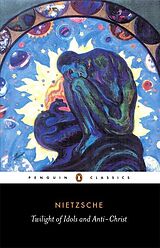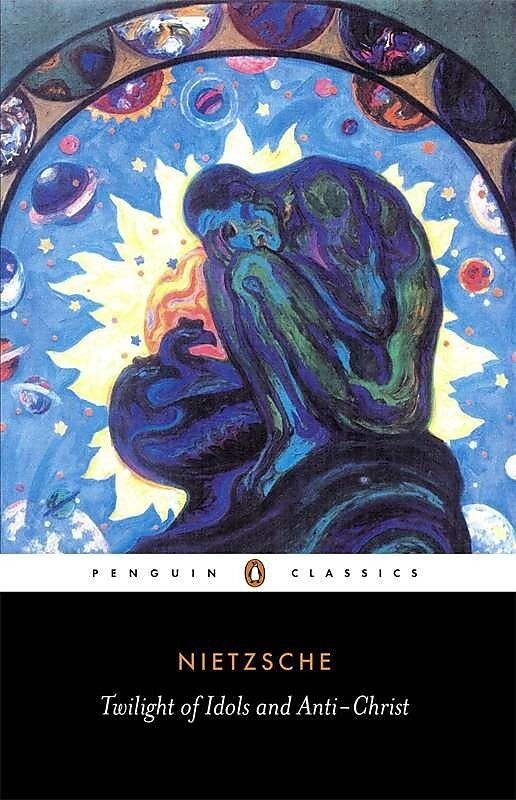Twilight of Idols and Anti-Christ
Einband:
Poche format B
EAN:
9780140445145
Untertitel:
Or How to Philosophize with a Hammer
Genre:
Belletristik & Unterhaltung
Autor:
Friedrich Nietzsche
Herausgeber:
Penguin Books Ltd
Auflage:
Revised edition
Anzahl Seiten:
224
Erscheinungsdatum:
25.01.1990
ISBN:
0140445145
Informationen zum Autor The philosopher Friedrich Nietzsche was born in Prussia in 1844. After the death of his father, a Lutheran minister, Nietzsche was raised from the age of five by his mother in a household of women. In 1869 he was appointed Professor of Classical Philology at the University of Basel, where he taught until 1879 when poor health forced him to retire. He never recovered from a nervous breakdown in 1889 and died eleven years later. Known for saying that god is dead, Nietzsche propounded his metaphysical construct of the superiority of the disciplined individual (superman) living in the present over traditional values derived from Christianity and its emphasis on heavenly rewards. His ideas were appropriated by the Fascists, who turned his theories into social realities that he had never intended. R. J. Hollingdale has translated eleven of Nietzsche's books and published two books about him. He has also translated works by, among others, Schopenhauer, Goethe, E. T. A. Hoffmann, Lichtenberg and Theodor Fontane, many of these for the Penguin Classics. He is Honorary President of the British Nietzsche Society, and was for the Australian academic year 1991 Visiting Fellow at Trinity College, Melbourne. Klappentext 'One must be superior to mankind in force, in loftiness of soul-in contempt' In these two devastating works, Nietzsche offers a sustained and often vitriolic attack on the morality and the beliefs of his time, in particular those of Hegel, Kant and Schopenhaur. Twilight of the Idols is a 'grand declaration of war' on reason, psychology and theology that combines highly charged personal attacks on his contemporaries with a lightning tour of his own philosophy. It also paves the way for The Anti-Christ, Nietzche's final assault on institutional Christianity, in which he identifies himself with the 'Dionysian' artist and confronts Christ; the only opponent he feels worthy of him. In his introduction Michael Tanner discussed the themes of Nietzche's argument and places the works in their historical and philosophical context. Zusammenfassung Reveals an understanding of human mean-spiritedness. Inhaltsverzeichnis Twilight of the Idols/The Anti-Christ Introduction Translator's Note Twilight of the Idols, or How to Philosophize with a Hammer Foreword Maxims and Arrows The Problems of Socrates "Reason" in Philosophy How the "Real World" at last Became a Myth Morality as Anti-Nature The Four Great Errors The "Improvers" of Mankind What the Germans Lack Expeditions of an Untimely Man What I Owe to the Ancients The Hammer Speaks The Anti-Christ Foreword The Anti-Christ Glossary of Names...
Autorentext
The philosopher Friedrich Nietzsche was born in Prussia in 1844. After the death of his father, a Lutheran minister, Nietzsche was raised from the age of five by his mother in a household of women. In 1869 he was appointed Professor of Classical Philology at the University of Basel, where he taught until 1879 when poor health forced him to retire. He never recovered from a nervous breakdown in 1889 and died eleven years later. Known for saying that “god is dead,” Nietzsche propounded his metaphysical construct of the superiority of the disciplined individual (superman) living in the present over traditional values derived from Christianity and its emphasis on heavenly rewards. His ideas were appropriated by the Fascists, who turned his theories into social realities that he had never intended.
R. J. Hollingdale has translated eleven of Nietzsche’s books and published two books about him. He has also translated works by, among others, Schopenhauer, Goethe, E. T. A. Hoffmann, Lichtenberg and Theodor Fontane, many of these for the Penguin Classics. He is Honorary President of the British Nietzsche Society, and was for the Australian academic year 1991 Visiting Fellow at Trinity College, Melbourne.
Klappentext
'One must be superior to mankind in force, in loftiness of soul-in contempt'In these two devastating works, Nietzsche offers a sustained and often vitriolic attack on the morality and the beliefs of his time, in particular those of Hegel, Kant and Schopenhaur. Twilight of the Idols is a 'grand declaration of war' on reason, psychology and theology that combines highly charged personal attacks on his contemporaries with a lightning tour of his own philosophy. It also paves the way for The Anti-Christ, Nietzche's final assault on institutional Christianity, in which he identifies himself with the 'Dionysian' artist and confronts Christ; the only opponent he feels worthy of him.In his introduction Michael Tanner discussed the themes of Nietzche's argument and places the works in their historical and philosophical context.
Zusammenfassung
Reveals an understanding of human mean-spiritedness.
Inhalt
Twilight of the Idols/The Anti-Christ Introduction
Translator's Note
Twilight of the Idols, or How to Philosophize with a Hammer
Foreword
Maxims and Arrows
The Problems of Socrates
"Reason" in Philosophy
How the "Real World" at last Became a Myth
Morality as Anti-Nature
The Four Great Errors
The "Improvers" of Mankind
What the Germans Lack
Expeditions of an Untimely Man
What I Owe to the Ancients
The Hammer Speaks
The Anti-Christ
Foreword
The Anti-Christ
Glossary of Names

Leider konnten wir für diesen Artikel keine Preise ermitteln ...
billigbuch.ch sucht jetzt für Sie die besten Angebote ...
Die aktuellen Verkaufspreise von 6 Onlineshops werden in Realtime abgefragt.
Sie können das gewünschte Produkt anschliessend direkt beim Anbieter Ihrer Wahl bestellen.
Loading...
Die aktuellen Verkaufspreise von 6 Onlineshops werden in Realtime abgefragt.
Sie können das gewünschte Produkt anschliessend direkt beim Anbieter Ihrer Wahl bestellen.
| # | Onlineshop | Preis CHF | Versand CHF | Total CHF | ||
|---|---|---|---|---|---|---|
| 1 | Seller | 0.00 | 0.00 | 0.00 |
